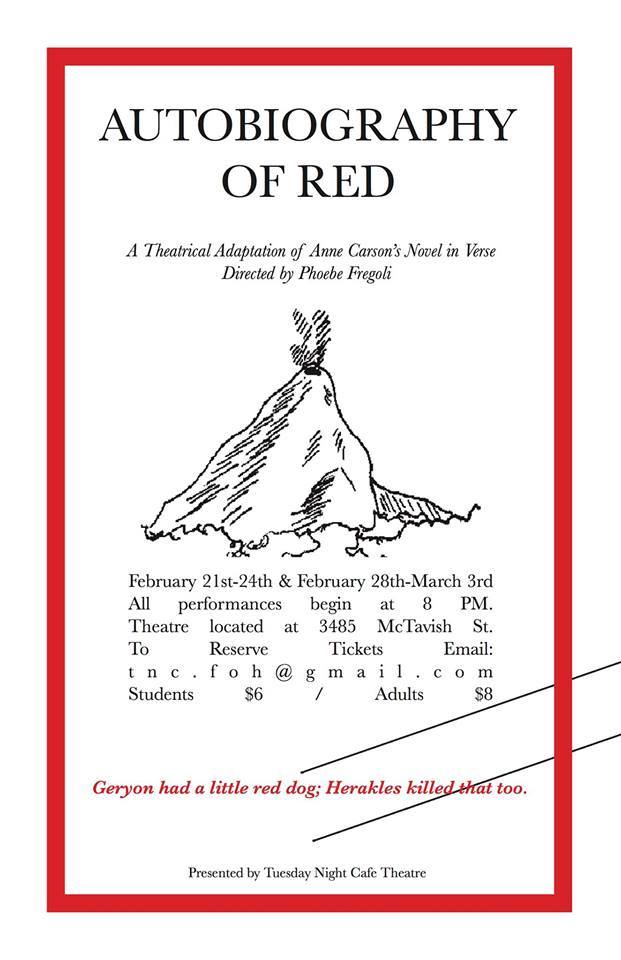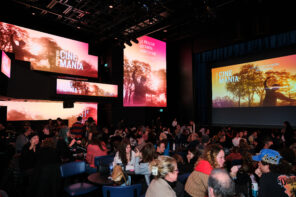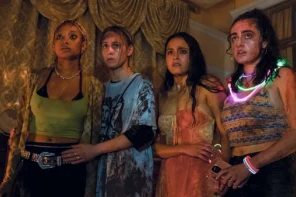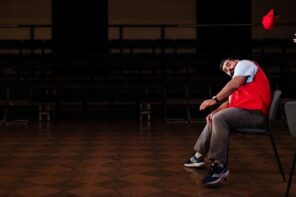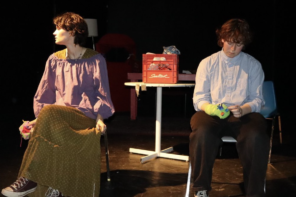Tuesday Night Cafe Theatre presents Autobiography of Red, written and directed by Phoebe Fregoli. CONTENT WARNING: this play deals with mature themes of trauma, and contains scenes of nudity.
Autobiography of Red is a theatrical adaptation of the novel in verse by Anne Carson, based loosely on the Twelve Labours of Hercules (Herakles). In Herakles’ Tenth Labour, he encounters and kills a winged red monster named Geryon. Geryon is but a footnote in the entirety of Herakles’ life, but Carson uses it as the basis for an entire novel. In Autobiography of Red, Geryon (Mich Cota) is an awkward, angsty teen and Herakles (Stephen Lawrence) is a bad boy from Hades. The two meet and tumble into a relationship full of new firsts, but Herakles eventually breaks Geryon’s heart. Years later, they encounter each other again in Argentina. It becomes apparent that neither of them fully moved on from their past relationship, despite Herakles’ new boyfriend, Ancash (José Camargo), in tow.
Carson’s work has been praised for its unconventional reimaginating of Herakles and Geryon, and its tender, honest perspective on first love, sex, and identity. While Carson’s words may have been beautiful on page, they fall flat on stage in Fregoli’s adaptation. Some works were not meant to be performed, and Autobiography of Red is one of them.
Carson’s poetry is clearly stunning when read, but this beauty is utterly lost when performed
This adaptation lacks the flow and context that makes Carson’s work complete. The actors struggle under the weight of Carson’s words, and are unable to deliver them convincingly. Instead, lines come across as awkward, pretentious, and out of place. In one scene, Geryon and his mother argue about his relationship with Herakles and he abruptly turns to the audience and says, woodenly, “Love does not make me gentle or kind.” In Carson’s novel, this scene goes:
“Stale peace of old bedtimes
filled the room. Love does not
make me gentle or kind, thought Geryon as he and his mother eyed each other
from opposite shores of the light”
Carson’s poetry is clearly stunning when read, but this beauty is utterly lost when performed. In another scene, Geryon lounges alone on his bed and says, dramatically and without context, “Herakles liked to make love early in the morning, like a sleepy bear taking the lid off a jar of honey.” It’s impossible to appreciate the beauty of Carson’s writing when the lines are picked out selectively, and blurted out awkwardly.
It’s clear that Fregoli attempted to choose the lines with the greatest impact, but in doing so she shed the meaning and artistry of the words completely. This means that the themes that Carson explores in her novel are neglected, however unintentionally. It’s hard to focus on the deeper themes of sexual trauma, heartbreak, and loss of self, when line after line comes off stilted.
In short, they’re a John Green cliche, and not even an endearing one at that
It’s also hard to look for deeper meaning in Geryon and Herakles’ relationship when the relationship itself is portrayed so unconvincingly. Again, this is due in large part to a script that is composed of fragmented lines and scenes, which makes it hard to act out a relationship that feels complete and believable. When they first met, they “recognized each other like italics,”; this is explicitly narrated to us by Geryon’s mother, another example of Fregoli’s selective line-inclusion falling short of what it intended to do. From there, it’s all downhill. Herakles and Geryon spend nights together at the railroad tracks, having philosophical discussions about stars, volcanoes, and photography. In short, they’re a John Green cliche, and not even an endearing one at that.
The only moments they produce real chemistry are during the sex scenes, which, aside from making their relationship somewhat believable, add little to the actual plot. Fregoli and the actors should be commended for their bravery and maturity in executing sex scenes in the full nude, but the scenes could easily have been done under covers, or skipped altogether. The inclusion of these scenes seems like a cheap ploy to seem “edgy” and add to the lure of the show overall, rather than a meaningful contribution to Herakles and Geryon’s story. They do little other than make the room intensely uncomfortable. Once again, the script is partially to blame. But Cota and Lawrence are just unable to do justice to Carson’s characters.
The rest of the cast’s performances are mixed. Rafaël Khoury’s performance as the Waiter is the strongest, and some much-needed comedic relief which actually feels well-placed and coherent. José Camargo also does well as Ancash, and his character is genuinely sympathetic. Several other characters felt off; it’s unclear if this was due to the actors themselves, or the script which forced them to make questionable choices. This is most apparent with Geryon. It’s clear what his character should be – moody, angsty, endearingly awkward, and “special” – like a Manic Pixie Dream Girl, but a sad and serious version.
His “quirkiness” is brought up incessantly to hammer home that Geryon is “different.” In one monologue, Geryon talks about how he “hears the cries of the roses, being burned alive in the noonday sun… like horses in war,” and bashfully remembers how his schoolmates (rightfully) stared at him as if they had no idea what he was talking about. But Cota has to balance this with Geryon’s obvious depression, trauma, and heartbreak over Herakles. The result is strange – in instances we’re supposed to find Geryon sympathetic, he comes off as grating and pretentious. Cota was not only tasked with a difficult character to pull off, but a script full of glaring holes that put the burden on her to bring Geryon to life. Ultimately, she failed, but the blame is not hers alone.
Fregoli, Cota, and the cast and crew should be commended for taking a risk with Autobiography of Red, and for having the bravery to tell this unconventional story. They handle a difficult subject matter with maturity. But this script would have taken Herculean strength to pull off, and the production was only human in its effort.
Autobiography of Red is on at Morrice Hall, at 3485 McTavish Street, from February 28 – March 3rd at 8pm. Tickets are $6 for students, and $10 general admission.

